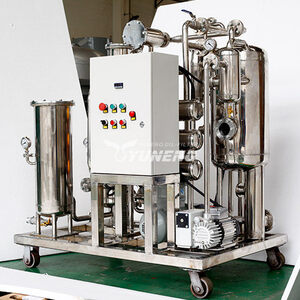Understanding the Environmental Impact of Fire-Resistant Oil Filtration Machines
Cuerpo
The Environmental Benefits
Fire-resistant oil filtration machines offer several environmental advantages that contribute to sustainability efforts within industrial operations:
- Fire Prevention: Perhaps the most significant environmental benefit of these machines is their ability to prevent fires caused by oil leakage or ignition. By using fire-resistant fluids, such as water-glycol solutions or phosphate esters, these machines minimize the risk of hazardous incidents, thus reducing the potential for environmental contamination and ecosystem damage.
- Enhanced Oil Efficiency: Fire-resistant oil filtration machines are designed to maintain oil quality and extend its lifespan through effective filtration. By removing contaminants and impurities, these machines optimize oil performance, leading to reduced oil consumption and waste generation. This efficiency improvement contributes to resource conservation and minimizes the environmental footprint associated with oil extraction and disposal.
- Regulatory Compliance: Many industries are subject to stringent environmental regulations governing the handling and disposal of hazardous materials, including oil-based fluids. Fire-resistant oil filtration machines, by mitigating fire risks and promoting safe oil management practices, help companies comply with environmental standards and avoid costly penalties for non-compliance.
The Environmental Considerations
Despite their positive attributes, fire-resistant oil filtration machines also pose certain environmental considerations that warrant attention:
- Fluid Disposal: While fire-resistant fluids offer enhanced safety properties, their disposal at the end of their service life can pose environmental challenges. Depending on the type of fluid used, proper disposal methods may be required to prevent contamination of soil and water resources. Additionally, the recycling or reclamation of fire-resistant fluids can be complex and may require specialized processes to ensure environmental integrity.
- Energy Consumption: Like any industrial equipment, fire-resistant oil filtration machines consume energy during operation, contributing to overall energy usage and greenhouse gas emissions. While modern machines are designed for energy efficiency, optimizing their performance through regular maintenance and operational adjustments can help minimize their environmental impact.
- Material Selection: The manufacturing process of fire-resistant oil filtration machines involves the use of various materials, some of which may have environmental implications. For example, the production of metal components may entail resource extraction and energy-intensive processes. Choosing sustainable materials and adopting eco-friendly manufacturing practices can mitigate these concerns and enhance the overall environmental profile of the machines.
Conclusion
Fire-resistant oil filtration machines play a crucial role in promoting safety and efficiency in industrial operations while also offering environmental benefits. By preventing fire hazards, optimizing oil usage, and facilitating regulatory compliance, these machines contribute to sustainable practices within the industry. However, it's essential for companies to consider the environmental considerations associated with the use and disposal of fire-resistant fluids, as well as the energy and material impacts of machine operation. Through responsible management and continuous improvement, the environmental impact of fire-resistant oil filtration machines can be effectively managed, ensuring a balance between safety, efficiency, and environmental stewardship.











Comentarios